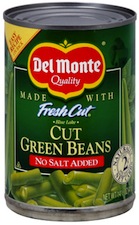Last fall, GoodFood World noted in BPA – Watch Those Green Beans that groups as disparate as Consumer Reports and the National Workgroup for Safe Markets have been studying the amount of bisphenol A (BPA) that could be consumed from eating canned food and drinks.
 A study by The National Work Group for Safe Markets, a coalition of public health and environmental health groups, tested food from 50 cans from 19 US states and one Canadian province for BPA contamination. Over 90% of the cans tested had detectable levels of BPA, some at higher levels than have been detected in previous studies.
A study by The National Work Group for Safe Markets, a coalition of public health and environmental health groups, tested food from 50 cans from 19 US states and one Canadian province for BPA contamination. Over 90% of the cans tested had detectable levels of BPA, some at higher levels than have been detected in previous studies.
One can of DelMonte green beans had the highest levels of BPA ever found in canned food.
Consumer Reports’ tested canned foods, including soups, juice, tuna, and green beans, and found that almost all of the 19 name-brand foods contained some BPA. The canned organic foods tested did not always have lower BPA levels than nonorganic brands of similar foods analyzed, and the chemical was even found in some products in cans that were labeled “BPA-free.”
Then, of course, we’re told that BPA is OK for us, according to a BPA industry group. The study concluded that bisphenol A (BPA) is safe was authored by researchers with ties to the plastic and chemical industries and was funded by Bayer Schering Pharma AG, the largest producer of BPA in Europe.
So who are we to believe?
Well, it looks like the FDA will have to believe its own scientists! Grist’s Tom Philpott says:
The next time an FDA panel convenes to discuss whether to ban BPA, the endocrine-disrupting industrial chemical used in can liners, it will have new data to consider — a study by the agency’s own scientists. In a just-released report, they tested a range of commonly used canned foods, from peas to chili, and found “detectable” levels of BPA in 71 of 78 samples.
Let me review those findings again:
- Over 90% of 50 cans tested had detectable levels of BPA
- Almost all of 19 name-brand foods contained some BPA
- Detectable levels of BPA in 71 of 78 samples
The good news is that the FDA has admitted that BPA — the endocrine-disrupting, heart disease-causing ingredient in plastic food packaging and can linings — isn’t entirely safe, particularly for infants and children.
The bad news? We’re still waiting to see when they will take action.
